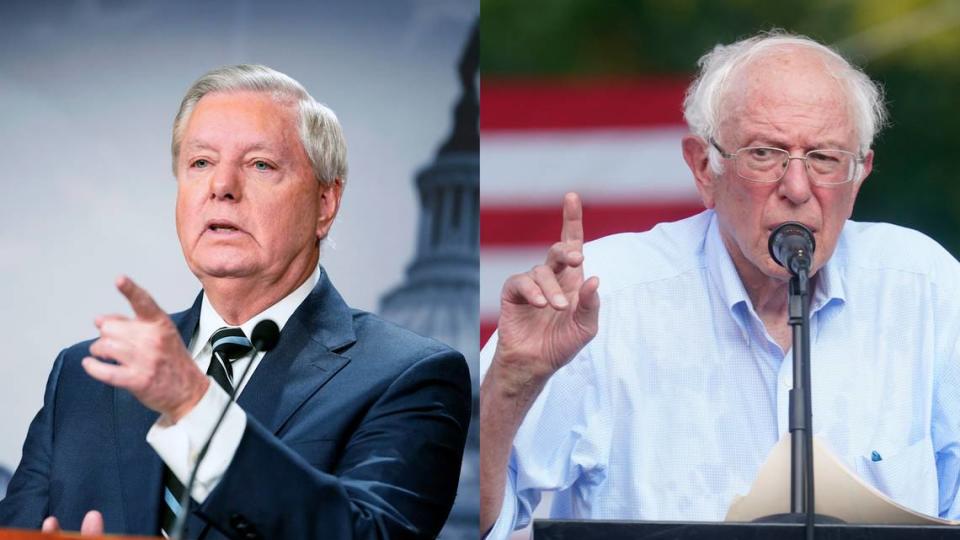SC’s Graham, Sanders square off in televised debate to find common ground in DC
- Oops!Something went wrong.Please try again later.
- Oops!Something went wrong.Please try again later.
- Oops!Something went wrong.Please try again later.
The purpose of Monday’s televised debate was to find policy common ground between South Carolina Republican Lindsey Graham and self-described Democratic Socialist Bernie Sanders — two veteran U.S. senators with not a whole lot in common.
The two did agree that Social Security has a solvency problem, that the future of the country’s transportation will be electric and that Russian President Vladimir Putin “sucks.”
But on major policy solutions — from gun control, to taxes, infrastructure, health care reform and foreign trade — the two could not have been further apart as they debated for 73 minutes Monday at the Kennedy Institute in Boston.
“What you got is that he sees it as a problem. I see it as a problem,” said Sanders, when moderator Bret Baier asked directly, for the second time, if the two saw any common ground on the budget and Social Security.
“I admire Sen. Sanders. He is on message, he’s got solutions — I don’t think they’ll work.,” Graham said. “I’ve never had such a hard time begging somebody to vote on their own bill.”
But on guns, for example, Graham said, “the bottom line is there are ways for it, but it’s got to be a bipartisan path. That’s the way it has been in the past, way it will be in the future and I stand ready to do that. But we need to stop this madness. What’s going on in Washington needs to stop.”
Monday’s debate, which was to find bipartisan agreements, was moderated by Fox News anchor Baier, who covered economic policy and ongoing issues in America.
The Oxford-style, long-form debate was announced May 25 as an effort by the Bipartisan Policy Center, the Orrin G. Hatch Foundation and the Edward M. Kennedy Institute to revive the bipartisan debate in the U.S. Senate.
The Bipartisan Policy Center — a D.C.-based think tank that promotes bipartisan policy solutions — said that “the culture of seeking common ground and consensus” of the U.S. Senate is often lost in present day.
The event is part of a series called The Senate Project that will continue with a second debate next month.
Senators debate guns, Putin and party politics
The debate on gun legislation — which was only discussed as the moderated debate came to a close and Sanders’s microphone cut him off with loud static for around three minutes of on-air confusion — was fairly inconclusive.
But the pair did agree that a new bipartisan framework to address gun violence was a step forward.
Sanders said he would vote for the proposal that a bipartisan group of 20 senators agreed upon recently.
“I think it is a step forward,” Sanders said. “I think clearly it does not go far enough.”
The proposal asserts nine main points to curb gun violence.
It provides money and resources for state intervention laws, mental health and telehealth services and programs in schools. It also would penalize straw purchases, protect victims of domestic abuse with restrictions and enhance the review process for those under 21 attempting to buy a firearm.
Sanders, of Vermont, noted that hunting is popular among his constituents and he is open-minded on gun ownership, but said he wants more from the bill. When asked for a closing statement about the common ground found on gun legislation, Sanders said, “No comment.”
A quip from Graham about needing to “put a quarter in” the static speaker later, Graham said he was encouraged by Sanders’ open mind, but that a more comprehensive proposal would be impossible, citing the 2013 Federal Assault Weapons Ban and its failure.
In the debate’s recurring talking point about oil, Sanders proposed the urgency of electric vehicles and “thoughtful solutions” to foreign trade. Graham said the situation was “supply and demand” and a result of a Democratic-controlled government.
Besides a back-and-forth on the gas crisis and health care, both senators generally stuck to their party lines, with little to no agreement. The only seeming common ground found in the debate was both senators agreeing that Social Security has a solvency issue and inflation is negatively rising, but no shared solutions were presented.
At one point during the debate Graham asked Sanders for agreement that “Putin sucks,” to which Sanders responded, “I’m not in favor of the vulgarity, but the intent is correct.”
Whether it was Sanders calling for the revitalization of democracy against oligarchy or Graham calling for the return of a Republican-run economy, the two senators, who both serve on the Senate Budget Committee, will surely face all of these disagreements again.
“I’m on the budget committee with Bernie. It’s been a blast. I thoroughly enjoyed it,” Graham said.


